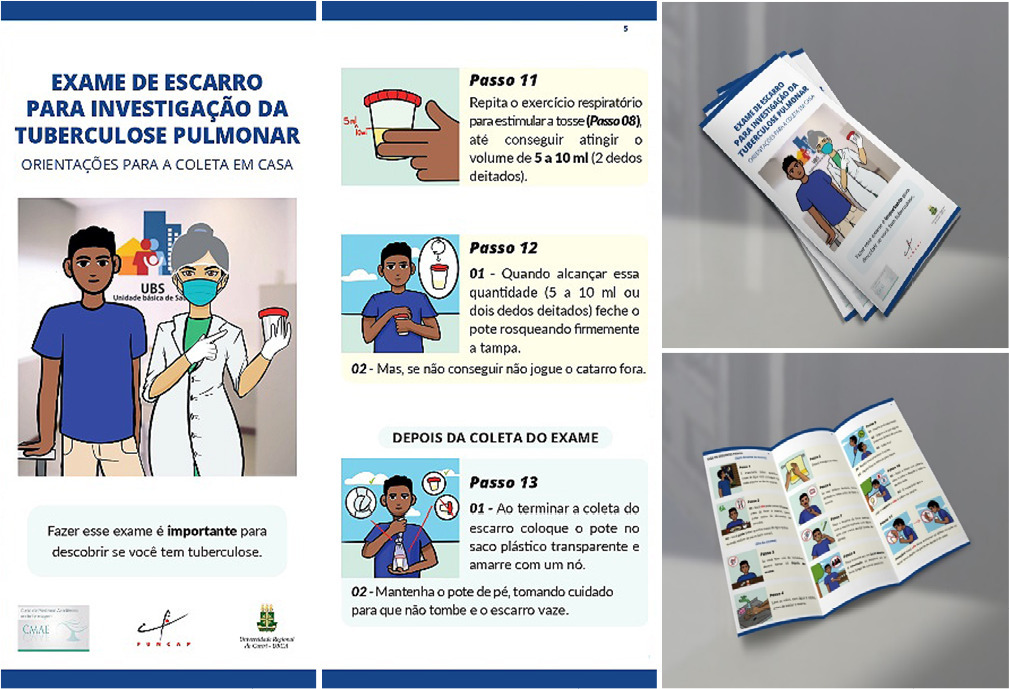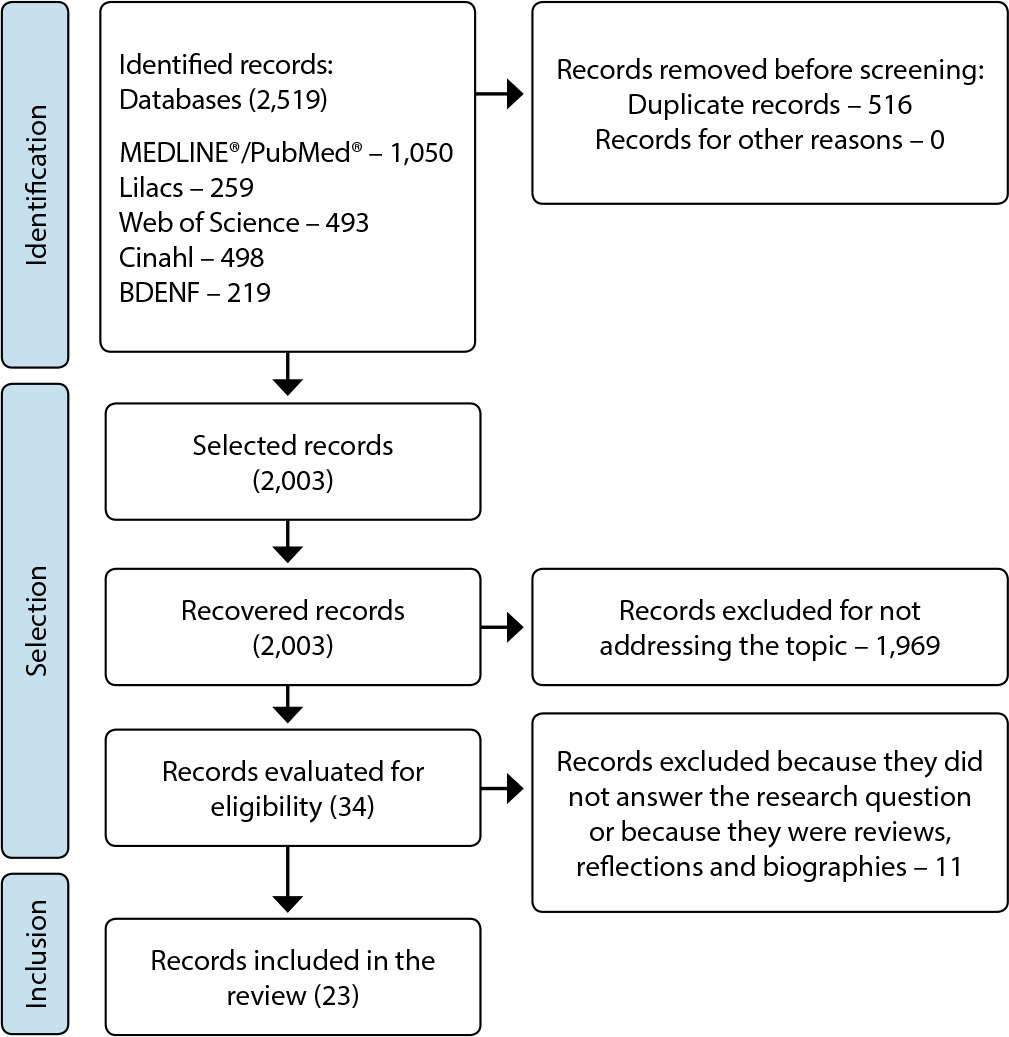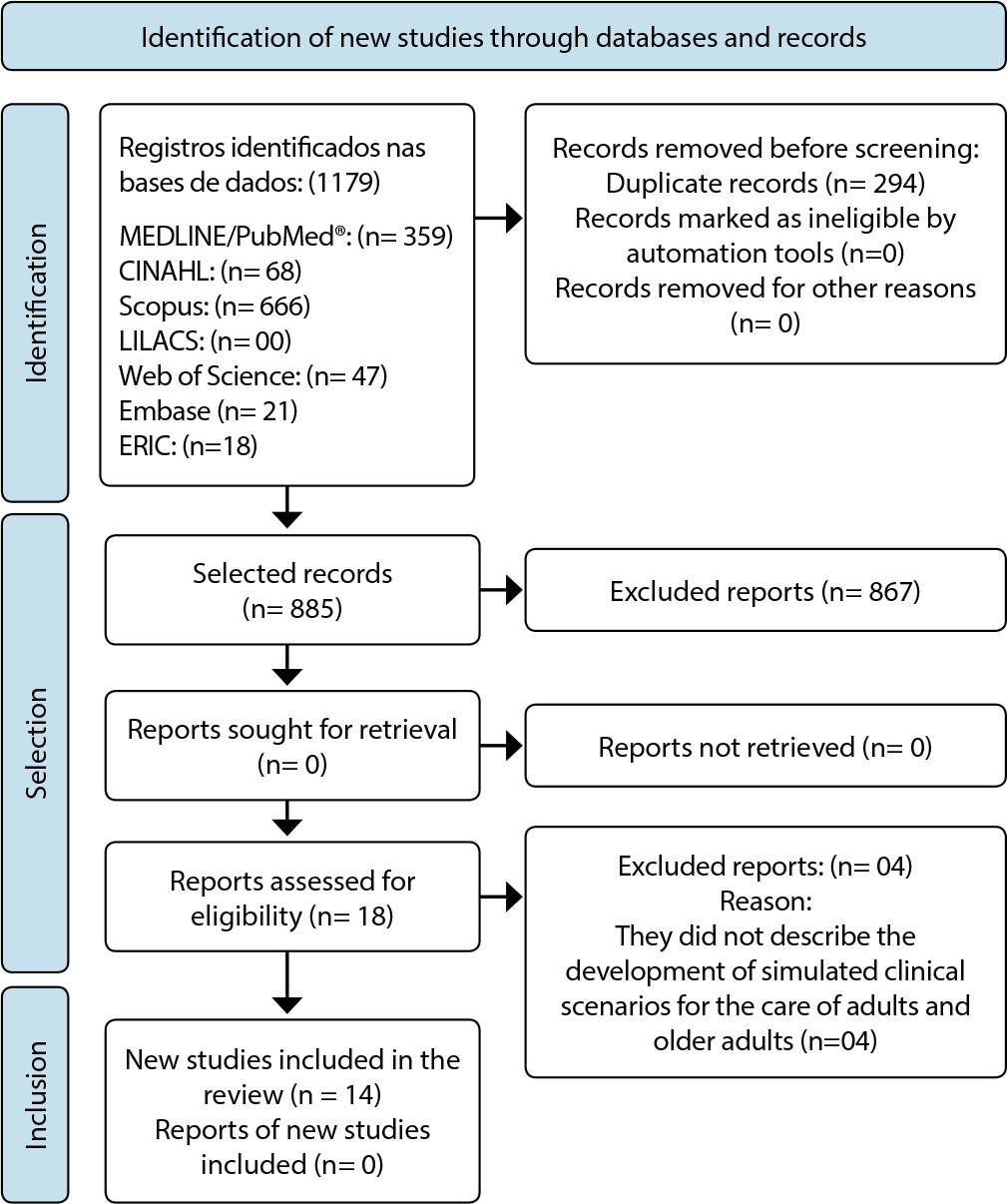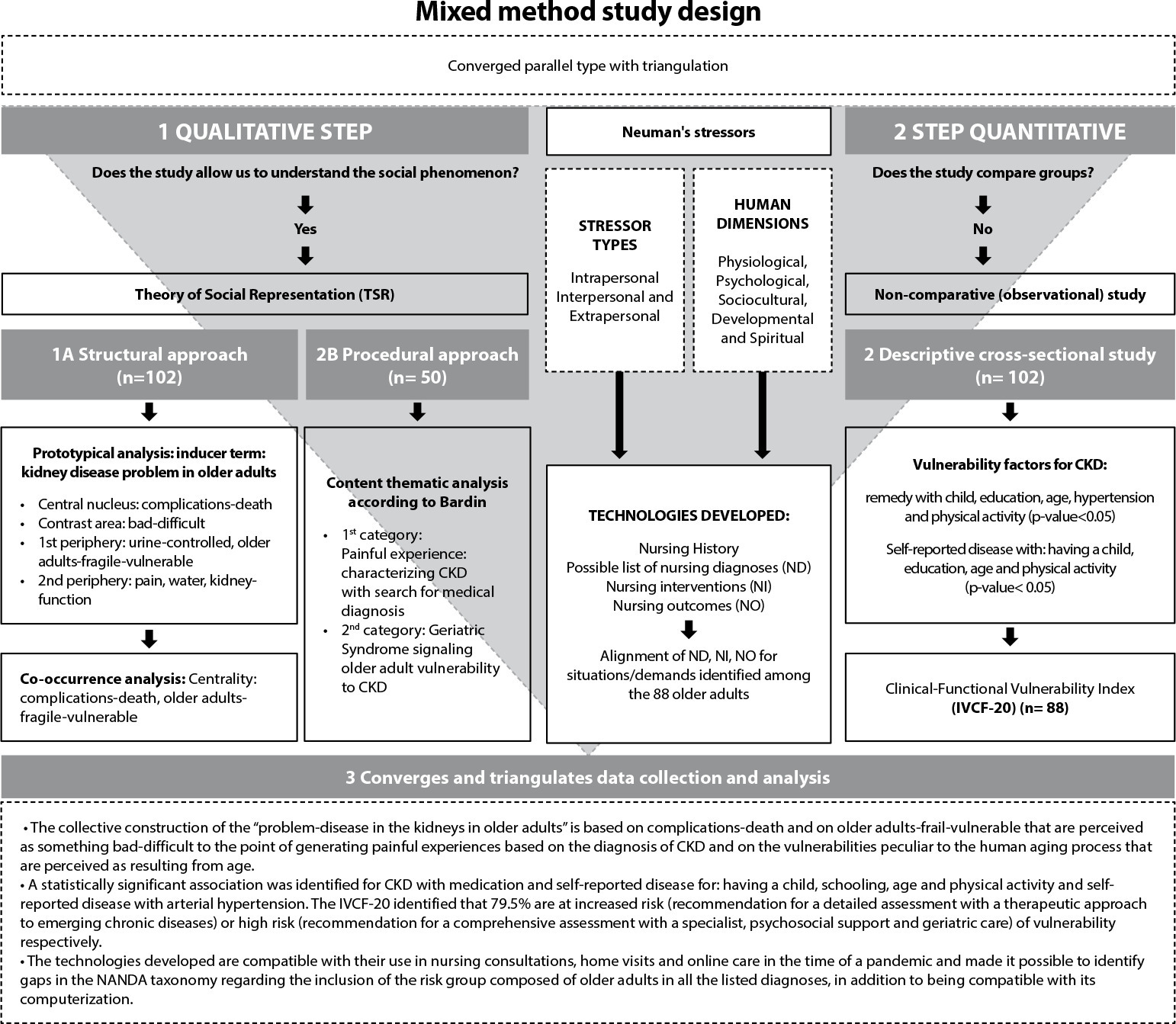-
ORIGINAL ARTICLE11-28-2023
Development and validity of an educational folder for pulmonary tuberculosis sputum collection
Revista Brasileira de Enfermagem. 2023;76(1):e20220194
Abstract
ORIGINAL ARTICLEDevelopment and validity of an educational folder for pulmonary tuberculosis sputum collection
Revista Brasileira de Enfermagem. 2023;76(1):e20220194
DOI 10.1590/0034-7167-2022-0194
Views0See moreABSTRACT
Objective:
to develop and validate an educational folder for pulmonary tuberculosis sputum collection.
Method:
a methodological study, developed in four phases: project design, bibliographic survey, development, and content and appearance validity. For validity, the Content Validity Index greater than or equal to 0.80, the Kappa Coefficient and the Suitability Assessment of Materials were adopted.
Results:
an educational folder was developed containing the recommended steps for quality sputum collection. It was validated by 19 expert judges in the first validity cycle, obtaining an overall Content Validity Index of 0.90, perfect agreement among judges, with a total Kappa of 0.83 and superior suitability.
Conclusion:
the material is valid, as it contains suitable, simple and attractive language, illustrations and layout, indicating perfect agreement and reliability. Thus, it has the potential to assist in carrying out the recommended steps for correct sputum collection and enable the correct diagnosis.

-
REVIEW11-28-2023
Contributions of the institutions for the nursing professionalization: integrative review (2010-2020) in the light of freidsonian conceptions
Revista Brasileira de Enfermagem. 2023;76(1):e20220153
Abstract
REVIEWContributions of the institutions for the nursing professionalization: integrative review (2010-2020) in the light of freidsonian conceptions
Revista Brasileira de Enfermagem. 2023;76(1):e20220153
DOI 10.1590/0034-7167-2022-0153
Views0See moreABSTRACT
Objective:
To analyze the contributions of the Brazilian Nursing Association and the Federal and Regional Nursing Councils in the literature for the professionalization of nursing in the light of Eliot Freidson’s theoretical conceptions.
Methods:
Integrative review of the literature, of socio-professional historical interest, carried out from June to November 2021, through the question: How did professional associations contribute to the professionalization of Brazilian nursing according to the literature from 2010 to 2020? The evidence were organized in a synoptic table, which allowed the construction of a conceptual map.
Results:
In the 23 selected studies, the professional associations presented scientific, social and political contributions, which shape the professional field of nursing, enabling knowledge/expertise, autonomy and self-regulation.
Final considerations:
The efforts of these institutions reaffirm nursing as an academic and consulting profession, capable of exerting control over the essence of nursing work. They strive to consolidate nursing as a legitimate professional field of health in Brazil.

-
REVIEW11-28-2023
Simulated scenarios in nursing: an integrative literature review
Revista Brasileira de Enfermagem. 2023;76(1):e20220123
Abstract
REVIEWSimulated scenarios in nursing: an integrative literature review
Revista Brasileira de Enfermagem. 2023;76(1):e20220123
DOI 10.1590/0034-7167-2022-0123
Views0See moreABSTRACT
Objectives:
to identify in scientific literature which simulated clinical scenarios were developed and validated for teaching and learning in nursing.
Methods:
integrative review, carried out in seven sources of information. The Rayyan program was used for selection, content analysis to explore the findings and the methodological assessment tool of the validity process, entitled Quality Appraisal tool for Validity Studies.
Results:
initially, 1,179 manuscripts were identified and 14 were part of the sample. Two categories were defined: Profile of simulated clinical scenarios produced in nursing; and Clinical skills developed and their assessment mechanisms.
Final Considerations:
there was a preponderance of high-fidelity scenarios, built in Brazil in the last five years, aimed at nursing students on the themes of emergency, maternal care and stomatherapy, addressing the assessment of cognitive, psychomotor and affective skills in nursing. Most studies obtained good methodological quality in their content validity process.

-
ORIGINAL ARTICLE11-28-2023
Factors associated with psychopathological symptoms among nurses at a university hospital
Revista Brasileira de Enfermagem. 2023;76(1):e20220075
Abstract
ORIGINAL ARTICLEFactors associated with psychopathological symptoms among nurses at a university hospital
Revista Brasileira de Enfermagem. 2023;76(1):e20220075
DOI 10.1590/0034-7167-2022-0075
Views0See moreABSTRACT
Objectives:
to analyze the factors associated with psychopathological symptoms among nurses at a university hospital.
Methods:
a cross-sectional study developed at a university hospital in Pernambuco, in which 90 nurses participated. A questionnaire with social and professional characteristics and the Symptom Assessment Scale were used.
Results:
an association was found between the variable changing profession and the presence of characteristic symptoms of psychoticism, somatization and anxiety among nurses.
Conclusions:
the emergence of psychopathological symptoms has influenced nurses’ desire to search for another profession. This evidence reinforces the need for greater investments in better working conditions and welcoming actions in the work environment, in order to provide a better quality of professional life and promote the health of these workers.
-
ORIGINAL ARTICLE11-28-2023
Nursing protocol in chronic kidney disease prevention in older adults in primary care
Revista Brasileira de Enfermagem. 2023;76(1):e20220052
Abstract
ORIGINAL ARTICLENursing protocol in chronic kidney disease prevention in older adults in primary care
Revista Brasileira de Enfermagem. 2023;76(1):e20220052
DOI 10.1590/0034-7167-2022-0052
Views0See moreASBTRACT
Objectives:
to develop a protocol for Nursing Process operationalization in approaching older adults with vulnerability to chronic kidney disease in Primary Health Care, based on Neuman’s stressors.
Methods:
a methodological study, carried out in two stages: 1) synthesis of evidence using an inductive strategy (mixed method study) and 2) protocol development to support the nursing process operationalization with older adults enrolled in a Basic Health Unit, using a deductive strategy (Neuman’s stressor concepts, NANDA, NIC, and NOC taxonomies, Risner’s line of reasoning, and cross-mapping), described according to A Step-by-Step Guide to Developing Protocols.
Results:
102 older adults participated, and 17 diagnoses, 34 interventions and 26 nursing outcomes were identified.
Conclusions:
the protocol developed is a technology that makes it possible to operationalize the Nursing Process, based on Neuman’s stressors and on taxonomy, conceptual and care frameworks, guiding care and nursing records.

-
ORIGINAL ARTICLE11-28-2023
Handgrip strength in older adults and driving aptitude
Revista Brasileira de Enfermagem. 2023;76(1):e20210729
Abstract
ORIGINAL ARTICLEHandgrip strength in older adults and driving aptitude
Revista Brasileira de Enfermagem. 2023;76(1):e20210729
DOI 10.1590/0034-7167-2021-0729
Views0See moreABSTRACT
Objective:
to analyze handgrip strength as a predictor of the inability to drive in older adults.
Method:
a cross-sectional study conducted in traffic clinics with 421 older adults in Curitiba-Paraná from January 2015 to December 2018. A sociodemographic and clinical questionnaire, handgrip strength test, and queries from the National Registry of Qualified Drivers form were applied.
Results:
Reduced handgrip strength was not a predictor of inaptitude for vehicular driving (p=0.649). The predictors of inaptitude were: low education (p=0.011), incomplete elementary education (p=0.027), and cognition (p=0.020).
Conclusion:
reduced handgrip strength was not shown to predict for loss of driving skills in older adults. Low education level and reduced cognition level are conditions that were shown to be predictors for loss of vehicular driving license.
-
ORIGINAL ARTICLE11-28-2023
The Chronic Care Model and its implications for Specialized Outpatient Care
Revista Brasileira de Enfermagem. 2023;76(1):e20210315
Abstract
ORIGINAL ARTICLEThe Chronic Care Model and its implications for Specialized Outpatient Care
Revista Brasileira de Enfermagem. 2023;76(1):e20210315
DOI 10.1590/0034-7167-2021-0315
Views0See moreABSTRACT
Objective:
to assess the Chronic Care Model implementation in Specialized Outpatient Care and its repercussions for health care.
Methods:
qualitative evaluative research, conducted by the Chronic Care Model. We used observation techniques, document analysis and interviews with 21 health professionals from specialized care. Analysis was conducted by triangulation, with the aid of MAXQDA software for initial and focused coding. All ethical aspects were respected.
Results:
professionals recognized that the model reorganized service care and administrative practices, presenting positive repercussions for the health of people assisted. The absence of continuing education for service professionals compromised the complete model implementation.
Final considerations:
the implementation, even if partial, of the model brings contributions to service improvement. The weaknesses that are still present are compatible with professionals’ difficulty in distancing themselves from the biomedical model.

-
EDITORIAL11-25-2022
Reflexões sobre a ciência em enfermagem gerontológica: possibilidades para o seu caminhar
Revista Brasileira de Enfermagem. 2022;75:e75Suppl401
Abstract
EDITORIALReflexões sobre a ciência em enfermagem gerontológica: possibilidades para o seu caminhar
Revista Brasileira de Enfermagem. 2022;75:e75Suppl401
DOI 10.1590/0034-7167.202275Suppl401pt
Views0O conhecimento científico em enfermagem gerontológica brasileiro tem seus primórdios há mais de 50 anos, especificamente em meados de 1970, alinhados ao movimento mundial de reconhecimento da complexidade do envelhecimento populacional e dos seus desafios na esfera social, cultural, política e de saúde pública. Desde então, a produção científica nesse campo guarda relação com a […]See more
-
Quality of life and physical activity in intensive care professionals from middle São Francisco
Revista Brasileira de Enfermagem. 2015;68(1):26-31
Abstract
Quality of life and physical activity in intensive care professionals from middle São Francisco
Revista Brasileira de Enfermagem. 2015;68(1):26-31
DOI 10.1590/0034-7167.2015680104i
Views0Objective:
the objective was to assess the level of physical activity (LPA) and the quality of life QL of the professionals who work in ICU.
Method:
this was a cross-sectional study carried out in Adult ICUs. LPA was assessed by the International Questionnarie of Physical Activity – short form (IQPA-SF) and the QL by the Medical Outcomes Study 36 (SF-36) questionnaire.
Results:
it was classified active 50.89% out of a total of 59 professionals. Nursing technicians were considered the most active with 60.6%. The QL of the professionals who were considered active were better when compared to inactives, with statistical differences to the category of physical aspects limitation, social aspects and mental health. The working hours were higher than recommend, the physicians were higher than the physical therapist, nurses and technicians nurses (p = 0.046).
Conclusion:
physically active professionals who work in ICU had higher quality of life probably why have lower hours of work and consequently more free time to engage in physical activity.
Keywords:Burnout ProfessionalHumanization of Hospital ServicesIntensive Care UnitPhisycal ActivityQuality of LifeSedentary LifestyleSee more
-
Learning needs of Nursing students in technical vocational education
Revista Brasileira de Enfermagem. 2015;68(1):20-25
Abstract
Learning needs of Nursing students in technical vocational education
Revista Brasileira de Enfermagem. 2015;68(1):20-25
DOI 10.1590/0034-7167.2015680103i
Views0See moreObjective:
identify learning needs of students of Technical Vocational Education (TVE) in Nursing. Qualitative study conducted in a city of São Paulo state.
Method:
the subjects were students, teachers and coordinators of TVE and students of the bachelor degree who have had contact with TVE. Data collection was performed by questionnaire socioeconomic and cultural circles about the learning needs. For data analysis we used the content analysis.
Results:
it was found that students have difficulties contents not related to nursing as portuguese and mathematics, as well as introductory courses in the course of TVE which possibly may interfere negatively in learning specific content of nursing and the quality of health care.
Conclusion:
it is necessary to rethink the content taught and ways to teach from basic education, as well as the training of teachers who now works in the TVE.
-
Serious game e-Baby: nursing students’ perception on learning about preterm newborn clinical assessment
Revista Brasileira de Enfermagem. 2015;68(1):13-19
Abstract
Serious game e-Baby: nursing students’ perception on learning about preterm newborn clinical assessment
Revista Brasileira de Enfermagem. 2015;68(1):13-19
DOI 10.1590/0034-7167.2015680102i
Views0See moreObjective:
to evaluate students opinion regarding e-Baby educational technology.
Methodology:
exploratory descriptive study in which participated a sample composed of 14 nursing Portuguese students that used e-Baby digital educational technology in an extracurricular course. To achieve the aim of the study, the data collection was realized through an opinion instrument in Likert scale including the possibility of commentaries by students. Is was also collected data of participants’ characterization.
Results:
students made very satisfactory evaluations regarding the game e-Baby, varying since usability acceptation through suggestions of expansion of the game to other nursing themes.
Conclusion:
serious game e-Baby can be considered a didactic innovation and motivator tool of learning. Besides, it demonstrates have adequate interface in design and educative function aspects, evocating intense interaction between user and computational tool.

-
EDITORIAL01-01-2015
Challenges beyond the scientific knowledge production
Revista Brasileira de Enfermagem. 2015;68(1):7-8
Abstract
EDITORIALChallenges beyond the scientific knowledge production
Revista Brasileira de Enfermagem. 2015;68(1):7-8
DOI 10.1590/0034-7167.2015680101p
Views0For several decades, innumerous appeals and reflections on how to build the nursing science and achieve visibility in the scientific world led researchers to make efforts to produce knowledge that contributed to the well-being of people, improving their quality of life, relieving their suffering and transforming the reality in which we live. In addition to […]See more
-
ERRATUM01-13-2024
ERRATUM
Revista Brasileira de Enfermagem. 2024;77(6):e2024n6e08
Abstract
ERRATUMERRATUM
Revista Brasileira de Enfermagem. 2024;77(6):e2024n6e08
DOI 10.1590/0034-7167.20247706e08
Views0In the article “Brazilian nursing specific situation, middle and micro-range theories: a bibliometric study”, with DOI number: , published in Revista Brasileira de Enfermagem, 2024;77(4):e20230520, Chart 1:Where it read:[…]See more -
ERRATUM01-13-2024
ERRATA
Revista Brasileira de Enfermagem. 2024;77(6):e2024n6e07
Abstract
ERRATUMERRATA
Revista Brasileira de Enfermagem. 2024;77(6):e2024n6e07
DOI 10.1590/0034-7167.20247706e06pt
Views0No artigo “Crenças e atitudes de pais ou responsáveis legais sobre a vacinação infantil: revisão de escopo”, com número DOI: , publicado no periódico Revista Brasileira de Enfermagem, 2024;77(4):e20240126, página 5:Onde se lia:[…]See more -
ORIGINAL ARTICLE01-13-2024
Indicators associated with severity and mortality in hospitalized people with HIV: A retrospective cohort
Revista Brasileira de Enfermagem. 2024;77(6):e20240204
Abstract
ORIGINAL ARTICLEIndicators associated with severity and mortality in hospitalized people with HIV: A retrospective cohort
Revista Brasileira de Enfermagem. 2024;77(6):e20240204
DOI 10.1590/0034-7167-2024-0204
Views0See moreABSTRACT
Objectives:
to compare the sociodemographic and clinical severity indicators of hospitalized people with HIV in relation to clinical outcomes and urgent hospital admission.
Methods:
a retrospective cohort study was conducted with 102 medical records of HIV-infected individuals hospitalized in a hospital in southern Brazil. In addition to descriptive analysis, Fisher’s exact test, Pearson’s Chi-square, and logistic regression were used.
Results:
the data showed a significant direct effect on severity indicators in the following variables: male sex (p=0.013), skin color (p=0.023), level of education (p=0.000), urgent admissions (p=0.000), late diagnosis (p=0.001), diabetes mellitus (p=0.001), hypertension (p=0.004), kidney disease (p=0.002), high viral load (p=0.006), CD4+ count below 200 (p=0.005), fever (p=0.016), weight loss (p=0.013), co-infection with hepatitis C (p=0.004), and mortality (p=0.007).
Conclusions:
three sociodemographic and thirteen clinical markers were identified as being associated with the risk of clinical deterioration in hospitalized people with HIV.

-
ORIGINAL ARTICLE01-13-2024
Nurses’ perspectives on the use of telemonitoring in the management of people with diabetes and hypertension
Revista Brasileira de Enfermagem. 2024;77(6):e20230481
Abstract
ORIGINAL ARTICLENurses’ perspectives on the use of telemonitoring in the management of people with diabetes and hypertension
Revista Brasileira de Enfermagem. 2024;77(6):e20230481
DOI 10.1590/0034-7167-2023-0481
Views1See moreABSTRACT
Objectives:
to understand the perspective of nurses on the use of telemonitoring in the management of people with type 2 diabetes mellitus and arterial hypertension in primary care.
Methods:
this qualitative research involved sixteen nurses from eight municipalities in Paraná. Data were collected between November 2022 and January 2023 through inperson or remote interviews, which were audio-recorded and subjected to content analysis.
Results:
according to the nurses, telemonitoring enhances users’ knowledge about these conditions, communication and connection with the team, and productivity. However, the lack of electronic resources and equipment, high staff turnover, low user adherence, and the limited availability of professional time present significant challenges.
Final Considerations:
the effective implementation and operation of telemonitoring in the management of people with diabetes and hypertension involve both potential benefits and barriers. It is essential to have the availability of human and technological resources, managerial support, and the commitment of professionals and users.
-
ORIGINAL ARTICLE01-13-2024
Knowledge, Attitudes, and Practices of nurses regarding blood culture collection
Revista Brasileira de Enfermagem. 2024;77(6):e20230424
Abstract
ORIGINAL ARTICLEKnowledge, Attitudes, and Practices of nurses regarding blood culture collection
Revista Brasileira de Enfermagem. 2024;77(6):e20230424
DOI 10.1590/0034-7167-2023-0424
Views0ABSTRACT
Objectives:
to investigate the knowledge, attitudes, and practices of nurses regarding blood culture collection.
Methods:
a cross-sectional study was conducted in five Brazilian public hospitals with 112 nurses. Data were collected using an adapted questionnaire and analyzed through descriptive and inferential statistics.
Results:
nurses who did not consider themselves capable of collecting blood cultures had a 72% lower chance of performing the collection at the recommended site and an 83% lower chance of using the same needle for blood inoculation into the vials. Nurses working in the emergency department had a 75% lower chance of knowing the international benchmark for blood culture contamination rates, and those with less than 5 years in the position decreased their chance of accuracy in this matter by 79%.
Conclusions:
there are gaps in the knowledge, attitudes, and practices of nurses regarding blood culture collection. Standardization of the technique, periodic education, supervision and guidance of the collection team, and process auditing are recommended coping strategies.
Keywords:Blood CultureBlood Specimen CollectionHealth Knowledge, Attitudes, PracticeNursing CareQuality of Health CareSee more
-
ORIGINAL ARTICLE01-13-2024
Evaluation of care for people with HIV in Primary Health Care: construct validation
Revista Brasileira de Enfermagem. 2024;77(6):e20230190
Abstract
ORIGINAL ARTICLEEvaluation of care for people with HIV in Primary Health Care: construct validation
Revista Brasileira de Enfermagem. 2024;77(6):e20230190
DOI 10.1590/0034-7167-2023-0190
Views0ABSTRACT
Objectives:
to verify the construct validation of an instrument for evaluating care for people living with HIV in Primary Health Care.
Methods:
methodological study carried out in 2021 with 260 health professionals in Recife, PE. Validation based on the internal structure was carried out at this stage using exploratory and confirmatory factor analysis, and validity based on item response theory.
Results:
the validation determined the retention of five factors and 63 items. The instrument’s internal consistency and quality of fit was 0.90, the Tukey-Lewis index was 0.915 and the comparative fit index was 0.918 in the confirmatory factor analysis. The indication for the absolute majority of items is adequate fit.
Conclusions:
the instrument has construct validity, making it possible to use it to evaluate the decentralization process and care for People Living with HIV in Primary Health Care.
Keywords:Acquired Immunodeficiency SyndromeComprehensive Health CareHIVPrimary Health CareProgram EvaluationSee more
-
ORIGINAL ARTICLE01-10-2024
Inventory of ethical problems in mobile pre-hospital care
Revista Brasileira de Enfermagem. 2024;77:e20230539
Abstract
ORIGINAL ARTICLEInventory of ethical problems in mobile pre-hospital care
Revista Brasileira de Enfermagem. 2024;77:e20230539
DOI 10.1590/0034-7167-2023-0539
Views0See moreABSTRACT
Objective:
to construct and validate the content of an inventory of ethical problems experienced by nurses in mobile pre-hospital care.
Method:
a psychometric approach study, developed with the following stages: (1) instrument construction through a theoretical matrix based on deliberative bioethics, scoping review and online qualitative research; (2) content validity by judges; (3) pre-testing with Mobile Emergency Care Service nurses in various Brazilian states. For content validity analysis, the Content Validity Ratio was calculated (CVR>0.45 for judges and CVR>0.35 for the target population).
Results:
the instrument had 44 items, distributed across four dimensions.
Final considerations:
the constructed instrument presented sources of evidence of content validity, providing good psychometric measurements and constituting a useful tool for nurses’ practice in the pre-hospital setting.

Search
Search in:
Nuvem de Tags
Aged (144) Atenção Primária à Saúde (239) COVID-19 (104) Cuidados de Enfermagem (269) Educação em Enfermagem (151) Educação em Saúde (139) Enfermagem (930) Estudos de Validação (131) Health Education (144) Idoso (208) Mental Health (149) Nursing (987) Nursing Care (306) Patient Safety (151) Primary Health Care (284) Qualidade de Vida (104) Quality of Life (106) Saúde Mental (145) Segurança do Paciente (150) Validation Studies (108)




